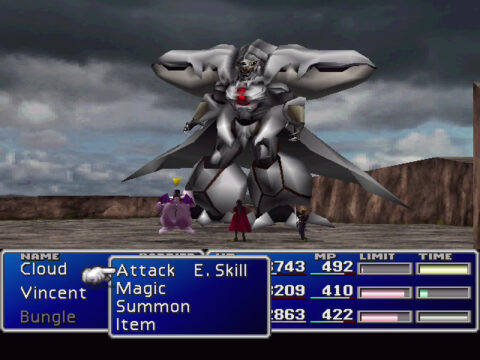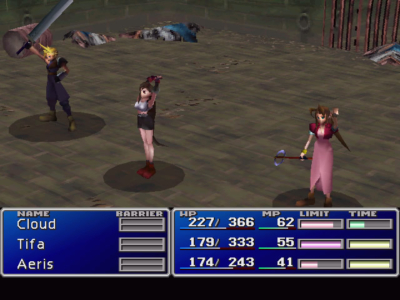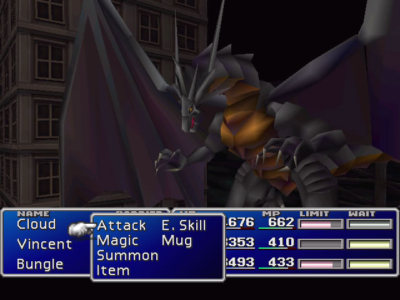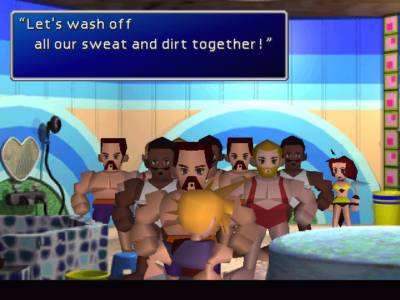
Final Fantasy VII
Written by: Stoo
Date posted: November 24, 2004
- Genre: RPG
- Developed by: Square
- Published by: Eidos
- Year released: 1998
- Our score: 9
In the world of console RPGs, the Final Fantasy series is something of a monster, spanning 18 years and 12 games (plus spin-offs). The first 6 titles were released for NES and SNES (although only three of those made it to a western release), gained quite a following and put Square firmly on the map as highly respected RPG developers. However, it was with the seventh title that Final Fantasy shot to fame. Seeing the series move to a new home on Sony Playstation, and sporting impressive 3D graphics, FF7 gained a huge fan following. Enough so that it spawned a spin-off CG movie 8 years later, that, well, at least isn’t as bad as some of the other game-based trainwrecks out there. Most importantly from our perspective on this site, however, it even managed a port to PC. Which a pretty rare occurrence for this subgenre.
The story to FF7 has at its heart Cloud Strife, a young spiky-haired chap with an implausibly huge sword. He’s a former soldier of SHINRA, a huge corporation that effectively rules much of the fictional world in which this game is set. Now plying his trade as a mercenary, Cloud has signed up with a gang of eco-terrorists, who believe SHINRA’s power-generating technology is damaging the planet. Not that he’s particularly ecologically minded himself, or given to any particular cause. A stone-hearted sort, or at least doing his best to be one, Cloud is for now just pursuing cold hard cash. Probably to fund a supply of swords and hair gel. However, two events soon radically change his direction in life. One is his encountering a humble flower-girl, last member of an ancient civilisation that once ruled the world. The other is the reappearance of Cloud’s old comrade-in-arms, the crazed super-soldier known as Sephiroth.
The game perhaps does not get off to the best of starts, with a raid on a SHINRA reactor. Half the time you’re just punching “continue” to get past dialogue and scripted scenes, interspersed with running along a very linear path, and fighting a few simple battles. It’s worth sticking with, however, as you get a feel for what’s going on and the handling of the game. As you continue more characters will be added to the roster, and you gain greater freedom of movement.
One thing you’ll notice right away; it’s pretty clear the settin g to FF7 is different from the usual fare of dwarves, wizards and castles that a PC gamer might associate with RPGs. The world it presents is one of advanced technology, but with plenty of magic and sword-waving also, and a bit of gaia theory thrown in for good measure. Enemies you’ll be fighting range from robots bristling with lasers and missiles to bizarre and twisted beasts. One section of the game sees you exploring a huge, gaudy and wonderfully tasteless casino complex. In another Cloud indulges in a spot of cross-dressing to infiltrate a crime lord’s lair. Point being, there’s a lot of imagination at work here, and absolutely no elves at any point, which leaves the game’s western peers looking a little staid.
As the game progresses you gain more access to the world via a map screen. At first you’re trudging around on foot, soon however you can ride Chocobos, ostrich-like creatures that seem to be a kind of mascot for the FF series. Finally you get access to an airship – another FF staple. There are a number of varied locations to reach, some exploring to be done and even a few side-quests to root out. Note however much of the time you’re not so much looking for a new adventure, as picking up the next thread of the main story. Meaning, many locations don’t really offer much to do until the narrative points you towards them. Morrowind’s open-ended sandbox of a game, this is not.
Your cast of heroes meanwhile are an entertaining bunch. My own favourite is the enviro-crusader Barrett who looks like Mr T and has a minigun grafted onto one arm. It’s possible that thanks to him I may at some point have shouted such slogans as “I pity the fool” or “I ain’t getting on no plane!” at the screen. Forgive me, I’m a child of the 80s. Amongst others you’ll also gain the aforementioned flower girl (who’s pretty handy with magic) and an oversized talking stuffed toy. Oh, and also a kung-fu babe with big knockers and a miniskirt. I would make disparaging comments about pandering to adolescents here, but to be honest I’m past my teenage years and can still appreciate kung-fu babes in miniskirts.
However that particular heroine is no mere eye candy, playing as she does an important part in Cloud’s story. In fact with each character the narrative often pauses the central thread to explore their motivations and backgrounds. Thus we learn to identify with the protagonists, laugh and maybe even cry with them. You can grow quite attached to the heroes as they go through their own personal journeys, alongside the main storyline. So again pretty much the opposite of Morrowind.
Of course, sooner or later you’re going to have to send these guys in to bash some monsters; for all the dialogue and cutscenes this game does not skimp on the combat. The battle system is known as “active time battle”, which handles as a hybrid of realtime and turn-based action. Each character has their own timer, and once a required interval has passed, you may issue them an order to fight, cast a spell, use an item etc. The timer then resets to zero, and begins counting again. Enemies meanwhile work to their own timers.
The basic action is a combat move – fire gun, kick, bite, slash with implausibly large sword depending on character. Your heroes can also gain use of spells by equipping special magic gems, each imbued with a certain type of spell such as fire attacks, healing, speed enhancement. With continued use the gems unlock more powerful versions of their spell, upgrading from “moderate lick of flame” to “awesome firey blast” and so on.
More powerful spells lead to more impressive graphics and lightshows, appropriate to the increased damage, and this reaches a peak in the “summons” spells. Each of these briefly calls forth a huge monster that will breath lightning on an enemy, rain boulders, or just generally chew up the scenery. Some of the effects are so ridiculously extravagant that you almost feel sorry for the poor enemy you’ve unleashed them on. I mean, ice blasts are one thing, a giant dragon descending from space shooting lasers from its eyes is just mean. Then again, providing you don’t powergame (i.e. spend 3 days running around a forest just to fight for experience and work your characters’ stats up) there are some genuinely challenging fights, worthy of the odd awesome spell or two.
There are a few more types of gem that allow other tricks like stealing from enemies, or providing resistance against a flavour of magic. The only real character customisation in the game comes from these; un-equipping the gems leaves them all pretty much the same apart from levels of physical strength. This might seem a nitpick but it’s worth noting that in FF6, each character had unique powers and abilities that were used and activated in various different ways, adding a little extra to your battle tactics. The only similar feature in FF7 are the “limit breaks”, powerful attacks fired off when a character takes heavy damage, but you don’t have much input on these and they’re too random to plan your attack around.
Beware also the random nature of battles. With the exception of “bosses”, enemies are not rendered on-screen, outside of combat. One minute you’re wondering through an empty-looking field or cave, the next an alert sounds and the game flicks from the general interface to combat mode. It’s similar to the nature of the Wizardry games, several years before this, and pretty annoying when you’re lost or just trying to get from A to B in a hurry. I might have hoped Square might have dropped the surprise random attacks by this point. Or at least gotten around to rendering monsters outside combat. Still as some compensation, most of these minor fights are relatively quick and simple affairs.
Overall I might say it’s not quite the most exciting of RPG combat – outside of some pretty epic boss fights, that is – but then from where I’m standing that’s tolerable. You see, until one day when the glorious ultimate perfect RPG ushers in a new era of geekery (if that’s a real word), I think different games in this genre offer different experiences. Some are all about the tactical combat, some a chance to build a hero to your own specification, others opportunities for much unscripted action and adventuring.
FF7 isn’t one of those; its performs adequately in some other areas but the real strength here is storytelling. There’s drama and excitement, heroism and sacrifice, humour and fear. You play because you want to know what Cloud will do next, or whether a certain character will survive, or what twist a new discovery will bring. At its heart is a tale of an impending apocalypse; maybe slightly cliched but suitably tense and ominous. However, there’s a whole other side to it that comes through Sephiroth playing mind games with the hero. What exactly is their relationship, where did they come from and what happened between them years ago?
Sooner or later you realise your perspective is not some godlike position with all the facts, but rather you only know as much as Cloud does. Except, he’s not entirely clear on what’s going on in his own head. Through this Sephiroth comes across as a genuinely charismatic but cruel villain. You want to smash his face in because he’s a posing, pretty-boy bastard who has made life hell for our heroes, not just cos he’s a boss fight. It’s through ways like this that FF7 immerses you in its narrative and gives you real incentive to play through to the small hours.
I could leave it there, but I’m constrained by my own modular approach to reviews and obliged to mention a few more points. Along the way you’ll be offered a few subgames, such as snowboarding and chocobo racing. You can also breed chocobos you catch in the wild, with the aim of producing an ultimate specimen. Personally I couldn’t be bothered with that side of the game, as it seemed more a distraction than something really worth the effort, but it might interest some of you. If you persevere, you can be rewarded with some extra-powerful weapons and spells such as “Knights of the Round”, which is probably the most over-the-top, lengthy and flashy magical effect I’ve ever seen in gaming. Such things are hardly required to beat the game, but might help against some optional super-tough boss monsters.
Finally, mention must be made of the soundtrack, written by the rather talented Nobuo Uematsu who’s worked on many Square games. There’s some pretty excellent pieces of music in there, from slow and moody pieces to more rousing battle tunes, that will get you in just the mood for the events taking place on screen. The bad news is, it’s all done by midi and your soundcard’s onboard synthesiser chip, so if you’re stuck with a cheapo card you won’t get the full effect. You can also buy better-quality versions of the official soundtrack, or look up remixes online, which is well worth it. Look for the choral work “one-winged-angel”, probably one of the most awesome pieces of music ever to thunder through your PC’s speakers.
That’s just about all I have to say. FF7 has built up a huge fan following over the years, to the extent that you might find a bit of a backlash and people grumbling that it’s over-rated. Myself, I can’t really comment on how well it compares to the rest of the FF series, or Japanese RPGs as a whole. Up against PC RPGs, however, it comes across as a breath of fresh air, something original and different amidst the elves and beards. Strangely tho it seemed to have relatively little impact, despite glowing reviews. One further FF title made it to PC, then the series gave up and stuck to Playstation. Meanwhile, as far as home-grown games go only lovely Anachronox seemed to follow the console style.
Successful or not, the point remains that this interloper from distant shores remains a worthy contender on PC. I can’t quite bring myself to hand out the full score (I’m sure Square will be gutted), if only because it does sometimes lack in variety, and doesn’t quite supply that compulsion to play through several times over that I look for in a top-scoring RPG. Still, we don’t hand out 9 out of 10 lightly here, and besides scoring isn’t a precise art. Depending on what you’re after in a game, you may well prefer this to the likes of Morrowind.





 Posts
Posts